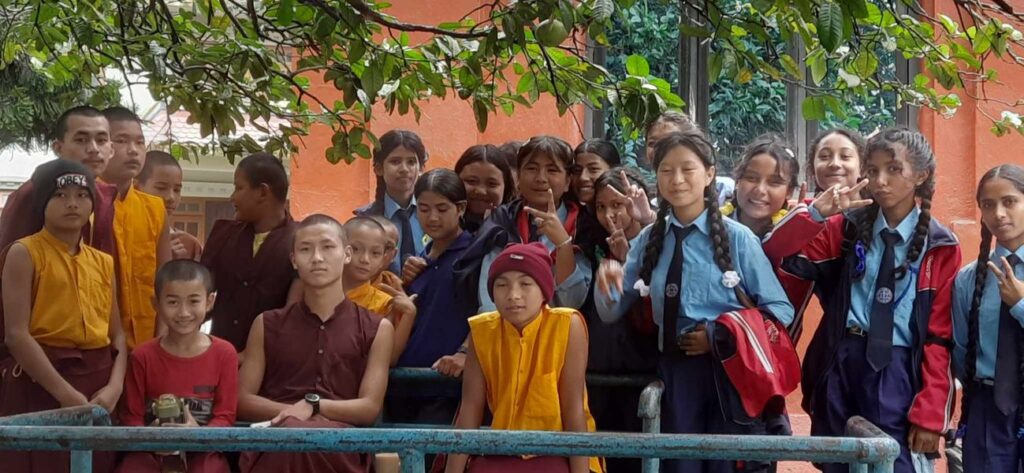The Ethics Education Fellowship successfully concluded its implementation with children in Nepal, reaching 350 students in nine different schools.
This unique program had a significant impact on children, leading to positive changes in their interactions with their parents and their community. Learners have demonstrated improved ethical decision-making skills, enhanced critical thinking abilities, and a stronger commitment to social responsibility.
Furthermore, the program had a significant impact beyond the targeted classrooms, creating a ripple effect throughout the school community, and fostering a safer and empowering learning environment for both students and teachers. “I gained the courage to express my thoughts. This transformed my fear into courage,” stated one of the students, reaffirming the positive results of the program.

The Ethics Education Fellowship
The Ethics Education Fellowship was launched in 2022 to strengthen the sustainable delivery of ethics education programs for children in formal education settings. The program seeks to foster ethical values in children, promote global citizenship, and contribute to building a more peaceful and inclusive society.
Implemented by the ministries of education of Bangladesh, Indonesia, Kenya, Mauritius, Nepal and Seychelles, the program functions as a collaborative effort among its partners: Arigatou International, the Guerrand-Hermès Foundation for Peace, the KAICIID International Dialogue Centre, the Muslim Council of Elders, the UNESCO Regional Office for Eastern Africa, and the UNESCO New Delhi Cluster Office, in collaboration with the National Commissions for UNESCO of the participating countries.
In its piloting phase, the initiative successfully impacted 323 teachers in the six participating countries, who have been trained in integrating ethics education into their teaching practice while reaching 7,334 children with outstanding results.
In Nepal, Value-based Education and Social Studies function as compulsory modules in basic and secondary education. Coming from a value-based educational approach, the Nepali education system thrives to promote concepts such as cooperation, teamwork, empathy, social responsibility, and non-violence to their learners from a young age. The integration of Ethics Education to advance children’s holistic development and ensure quality education was identified as a seamless intervention to add value to their existing educational framework.
National Teacher Training Workshop in Nepal
The program took off in Nepal with a national teacher training workshop for 18 teachers from nine schools. The workshop was held in Dhulikhel, Kavre, from 26-30 March 2023 under the auspices of the Nepali Ministry of Education, Science and Technology (MoEST), United Nations Educational, Scientific and Cultural Organization (UNESCO) Delhi and Kathmandu, and the Fellowship partners.
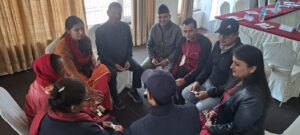
The opening ceremony benefited from the presence of Mr. Ramkrishna Subedi, Secretary, Ministry of Education, Science and Technology of Nepal; Mr. Rameshwar Prasad Yadav, Deputy Secretary General, Nepal National Commission for UNESCO; Dr. Hari Prasad Lamsal, Joint Secretary, Ministry of Education, Science and Technology of Nepal.
The speakers highlighted the importance of helping children embrace a world of diversity, where they can live together with empathy, responsibility and integrity. They spoke of the role of education in creating transformative learning opportunities and facilitating dialogue across cultural and religious differences.
The training process for teachers in Nepal contributed to enhancing their capacity for interfaith and intercultural learning. It used a comprehensive approach that addressed both theoretical knowledge and practical skills. Throughout the workshop, teachers improved their capacities to create safe learning spaces for children and were empowered to effectively support inter-faith and intercultural learning in their classrooms, fostering mutual understanding, respect, and appreciation for Nepal’s diverse religious and cultural heritage.
“The training made me more aware of ideas such as ethics, integrity, and developing positive thinking. I have felt more responsible while performing the organizational work and consulting the stakeholders. I have taken ethics as a life philosophy”, shared a participant of the workshop reflecting on their five-day learning journey.
As part of the workshop, the teachers were also trained on Monitoring, Evaluation, and Learning (MEL) principles, providing them with the tools and knowledge needed to measure the impact of the local implementation in schools that followed the workshop. This allowed the educators to also become more aware of their impact and identify areas for improvement. Their recommendations were also collected to contribute to the enhancement of the program.
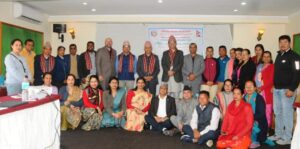
Local Implementation at the School Level
Before the implementation of ethics education in the classrooms, a national-level steering committee and a technical committee were constituted by the Nepali Ministry of Education to spearhead this effort. This allocated a dedicated space for dialogue and advocacy for Ethics Education to take shape in the Nepali education system while ensuring its effective integration with value-based education to sustain these interventions.
During the pilot school-level implementation, the schools and groups of students taking part were carefully selected using an inclusive approach to capture the rich diversity of the country. It included different regions and communities in Kathmandu, Bardibas, and Hupsekot.
The implementation phase started in April and continued until October 2023, encompassing a total of 35 sessions for each group of children. The program involved educators specializing in Social Studies and Human Values for Grades 6-8. In its first phase, the program seamlessly integrated ethics education into the curricula and introduced the concept through the newly formed Peace Clubs.
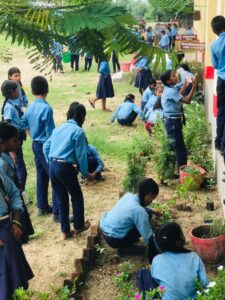
Additionally, the teachers incorporated a variety of special activities to engage learners in meaningful ethical exploration and discourse. These activities aimed to foster an understanding of diverse perspectives, promote interfaith harmony, and encourage responsible citizenship. The activities included experience sharing and storytelling, debates and role-playing, inter-cultural celebrations, speech/art contests, awareness-building rallies, and service projects.
One of the key activities could be listed as the interfaith visits they organized within their communities, which allowed the learners to visit different places of worship from various faiths. This provided learners with an opportunity to experience different religious traditions and cultures firsthand and foster a deeper understanding of the values, rituals, and practices of various faith communities. They also engaged in respectful dialogue with members of these religious communities, exploring common ethical principles and shared values that transcend religious boundaries.
Following the implementation of the program, teachers identified positive changes among their learners both within the classrooms and community settings. These changes are connected to their increased awareness of ethical issues in their community, increased participation in ethical reflection and discussion, enhanced capacity to make decisions based on ethical standpoints, and the ability to connect ethical values with real-world issues. Furthermore, the learners showcased positive behavioral change among their peers, teachers, and families alike, contributing to creating a more peaceful, empathetic, and tolerant community. This change has addressed certain conflicts that existed in the school system such as bullying and other forms of anti-social behaviors while at the same time fostering better teacher-student relationships.
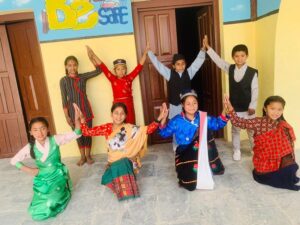
“I used to be afraid to speak with teachers, friends, siblings, or acquaintances about issues related to ethical education before participating in educational activities connected to my class. After enrolling in Ethics Education, I gained the courage to express my thoughts. This transformed my fear into courage and now, speaking to someone from another region doesn’t make me afraid”, shared a student from Nepal.
The implementation with children in Nepal reaffirmed the importance of introducing ethics education at an early age and the need for a comprehensive whole-school approach. The experience demonstrated the importance of having role models, the need for open and honest dialogue, the importance of real-world application, and the need for collaboration.
We would like to share our gratitude and appreciation for all the fellows from Nepal: Mr. Govinda Prasad Aryal, Mr. Khubiram Adhikari, Ms. Saraswoti Bhattarai, Ms. Sarita Devi Sharma, and Ms. Dewaka Dhakai who championed ethics education in their local settings with valuable contributions and non-wavering commitment. We would also like to express our sincere gratitude to the teachers who implemented the program with the children in the field. Your dedication and commitment to the integration of Ethics Education locally proved to be immensely impactful and made a real value addition to the entire program. Also, a special mention is reserved for Dr. Basu Peasad Subedi, the Monitoring, Evaluation, and Learning focal point for the program in Nepal. Finally, our appreciation goes to the partners and organizations that were involved, whose collaboration and support have played a pivotal role in ensuring the sustainability of this program.
